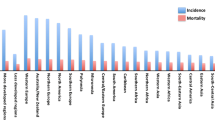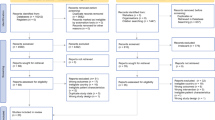Abstract
Women tested for mutations in BRCA1/2 genes who have minor-aged children confront difficult decisions about if, when, and how to share information about hereditary cancer risk with their children. These choices are often seemingly influenced by how mothers anticipate the emotional burdens they and their children will experience in response to test results. Here, we investigate the association between maternal cognitions, pretest psychological well-being, and coping style with mothers’ anticipated emotional reactions to learning that they are BRCA1/2 mutation carriers (N = 205). In a linear regression model adjusted for maternal demographics, stronger tendencies to ruminate about information (B = .14, p = .03), greater psychological strain (B = .14, p < .001), and poorer appraisals of one’s ability to cope with genetic test results conveying increased breast cancer risk information (B = −.25, p < .001) were significantly associated with anticipating more negative affect surrounding BRCA1/2 mutation identification in mothers. Our data contribute to the growing awareness of special concerns that mothers have about knowing their BRCA1/2 mutation status and highlight the need for more tailored patient education and counseling resources to improve outcomes among women at risk and their children.
Similar content being viewed by others
References
Burrows KR, Kelley CK (1983) Parental interrater reliability as a function of situational specificity and familiarity of target child. J Abnorm Child Psychol 11(1):41–47
Cacioppo JT, Petty RE, Kao CF (1984) The efficient assessment of need for cognition. J Pers Assess 48(3):306–307
Chiou WB, Yang ML (2010) The moderating role of need for cognition on excessive searching bias: a case of finding romantic partners online. Stud Health Technol Inform 154:120–122
Cukier YR, Thompson HS, Sussner K, Forman A, Jandorf L, Edwards T, Bovbjerg DH, Schwartz MD, Valdimarsdottir HB (2013) Factors associated with psychological distress among women of African descent at high risk for BRCA mutations. J Genet Couns 22(1):101–107
Davies PT, Manning LG, Cicchetti D (2013) Tracing the cascade of children’s insecurity in the interparental relationship: the role of stage-salient tasks. Child Dev 84(1):297–312
Dorval M, Patenaude AF, Schneider KA, Kieffer SA, DiGianni L, Kalkbrenner KJ, Bromberg JI, Basili LA, Calzone K, Stopfer J, Weber BL, Garber JE (2000) Anticipated versus actual emotional reactions to disclosure of results of genetic tests for cancer susceptibility: findings from p53 and BRCA1 testing programs. J Clin Oncol 18(10):2135–2142
Dunn EW, Brackett MA, Ashton-James C, Schneiderman E, Salovey P (2007) On emotionally intelligent time travel: individual differences in affective forecasting ability. Personal Soc Psychol Bull 33(1):85–93
Dunphy BC, Cantwell R, Bourke S, Fleming M, Smith B, Joseph KS, Dunphy SL (2010) Cognitive elements in clinical decision-making: toward a cognitive model for medical education and understanding clinical reasoning. Adv Health Sci Educ Theory Pract 15(2):229–250
Elwyn G, Miron-Shatz T (2010) Deliberation before determination: the definition and evaluation of good decision making. Health Expect 13(2):139–147
Esplen MJ, Cappelli M, Wong J, Bottorff JL, Hunter J, Carroll J, Dorval M, Wilson B, Allanson J, Semotiuk K, Aronson M, Bordeleau L, Charlemagne N, Meschino W (2013) Development and validation of a brief screening instrument for psychosocial risk associated with genetic testing: a pan-Canadian cohort study. BMJ Open 3(3). doi:10.1136/bmjopen-2012-002227
Farkas Patenaude A, DeMarco TA, Peshkin BN, Valdimarsdottir H, Garber JE, Schneider KA, Hewitt L, Hamilton J, Tercyak KP (2013) Talking to children about maternal BRCA1/2 genetic test results: a qualitative study of parental perceptions and advice. J Genet Couns 22(3):303–314
French DP, Sutton S, Hennings SJ, Mitchell J, Wareham NJ, Griffin S, Hardeman W, Kinmonth AL (2005) The importance of affective beliefs and attitudes in the theory of planned behavior: predicting intention to increase physical activity. J Appl Soc Psychol 35(9):1824–1848
Gilbert DT, Pinel EC, Wilson TD, Blumberg SJ, Wheatley TP (1998) Immune neglect: a source of durability bias in affective forecasting. J Pers Soc Psychol 75(3):617–638
Halbert CH, Schwartz MD, Wenzel L, Narod S, Peshkin BN, Cella D, Lerman C (2004) Predictors of cognitive appraisals following genetic testing for BRCA1 and BRCA2 mutations. J Behav Med 27(4):373–392
Halpern SD (2012) Shaping end-of-life care: behavioral economics and advance directives. Semin Respir Crit Care Med 33(4):393–400
Halpern J, Arnold RM (2008) Affective forecasting: an unrecognized challenge in making serious health decisions. J Gen Intern Med 23(10):1708–1712
Heiniger L, Butow PN, Price MA, Charles M (2013) Distress in unaffected individuals who decline, delay or remain ineligible for genetic testing for hereditary diseases: a systematic review. Psychooncology 22(9):1930–1945
Hooker GW, Leventhal KG, DeMarco T, Peshkin BN, Finch C, Wahl E, Joines JR, Brown K, Valdimarsdottir H, Schwartz MD (2011) Longitudinal changes in patient distress following interactive decision aid use among BRCA1/2 carriers: a randomized trial. Med Dec Making 31(3):412–421
Lazarus RS, Folkman S (1984) Stress, appraisal, and coping. Springer, New York
Levine LJ, Lench HC, Kaplan RL, Safer MA (2012) Accuracy and artifact: reexamining the intensity bias in affective forecasting. J Pers Soc Psychol 103(4):584–605
Mathieu MT, Gosling SD (2012) The accuracy or inaccuracy of affective forecasts depends on how accuracy is indexed: a meta-analysis of past studies. Psychol Sci 23(2):161–162
Mays D, DeMarco TA, Luta G, Peshkin BN, Patenaude AF, Schneider KA, Garber JE, Tercyak KP (2013) Distress and the parenting dynamic among BRCA1/2 tested mothers and their partners. Health Psychol. doi:10.1037/a0033418
Melnyk D, Shepperd JA (2012) Avoiding risk information about breast cancer. Ann Behav Med 44(2):216–224
O'Neill SC, Rini C, Goldsmith RE, Valdimarsdottir H, Cohen LH, Schwartz MD (2009) Distress among women receiving uninformative BRCA1/2 results: 12-month outcomes. Psychooncology 18(10):1088–1096
Patenaude AF, Dorval M, DiGianni LS, Schneider KA, Chittenden A, Garber JE (2006) Sharing BRCA1/2 test results with first-degree relatives: factors predicting who women tell. J Clin Oncol 24(4):700–706
Patrick-Miller L, Bradbury AR, Terry MB (2010) Controversies in communication of genetic screening results for cancer: a report from the American Society of Preventive Oncology’s Screening Special Interest Group (ASPO’s 33rd Annual Meeting, March 8 to 10, 2009, Tampa, Florida). Cancer Epidemiol Biomarkers Prev 19(2):624–627
Peshkin BN, DeMarco TA, Tercyak KP (2010) On the development of a decision support intervention for mothers undergoing BRCA1/2 cancer genetic testing regarding communicating test results to their children. Familial Cancer 9(1):89–97
Peters SA, Laham SM, Pachter N, Winship IM (2014) The future in clinical genetics: affective forecasting biases in patient and clinician decision making. Clin Genet 85(4):312–317
Petty RE, DeMarree KG, Brinol P, Horcajo J, Strathman AJ (2008) Need for cognition can magnify or attenuate priming effects in social judgment. Personal Soc Psychol Bull 34(7):900–912
Petty RE, Brinol P, Loersch C, McCaslin MJ (2009) Chapter 21. The need for cognition. In: Leary MR, Hoyle RH (eds) Handbook of individual differences in social behavior. Guilford, New York, pp 318–329
Rini C, O'Neill SC, Valdimarsdottir H, Goldsmith RE, Jandorf L, Brown K, DeMarco TA, Peshkin BN, Schwartz MD (2009) Cognitive and emotional factors predicting decisional conflict among high-risk breast cancer survivors who receive uninformative BRCA1/2 results. Health Psychol 28(5):569–578
Roisman GI, Newman DA, Fraley RC, Haltigan JD, Groh AM, Haydon KC (2012) Distinguishing differential susceptibility from diathesis-stress: recommendations for evaluating interaction effects. Dev Psychopathol 24(2):389–409
Ruby MB, Dunn EW, Perrino A, Gillis R, Viel S (2011) The invisible benefits of exercise. Health Psychol 30(1):67–74
Schwartz MD, Isaacs C, Graves KD, Poggi E, Peshkin BN, Gell C, Finch C, Kelly S, Taylor KL, Perley L (2012) Long-term outcomes of BRCA1/BRCA2 testing: risk reduction and surveillance. Cancer 118(2):510–517
Sharff ME, DeMarco TA, Mays D, Peshkin BN, Valdimarsdottir HB, Garber JE, Schneider KA, Patenaude AF, Tercyak KP (2012) Parenting through genetic uncertainty: themes in the disclosure of breast cancer risk information to children. Genet Test Mol Biomarkers 16(5):376–382
Tercyak KP, Hughes C, Main D, Snyder C, Lynch JF, Lynch HT, Lerman C (2001) Parental communication of BRCA1/2 genetic test results to children. Patient Educ Couns 42(3):213–224
Tercyak KP, Peshkin BN, DeMarco TA, Brogan BM, Lerman C (2002) Parent–child factors and their effect on communicating BRCA1/2 test results to children. Patient Educ Couns 47(2):145–153
Tercyak KP, Peshkin BN, DeMarco TA, Patenaude AF, Schneider KA, Garber JE, Valdimarsdottir HB, Schwartz MD (2007) Information needs of mothers regarding communicating BRCA1/2 cancer genetic test results to their children. Genet Test 11(3):249–255
Tercyak KP, Mays D, DeMarco TA, Peshkin BN, Valdimarsdottir HB, Schneider KA, Garber JE, Patenaude AF (2013) Decisional outcomes of maternal disclosure of BRCA1/2 genetic test results to children. Cancer Epidemiol Biomarkers Prev 22(7):1260–1266
Weil J (2003) Psychosocial genetic counseling in the post-nondirective era: a point of view. J Genet Couns 12(3):199–211
Wilson TD, Gilbert DT (2003) Affective forecasting. Adv Exp Soc Psychol 35:345–411
Zabora J, BrintzenhofeSzoc K, Curbow B, Hooker C, Piantadosi S (2001) The prevalence of psychological distress by cancer site. Psychooncology 10(1):19–28
Acknowledgments
This work was supported in part by Public Health Service Grant R01HG002686 (KPT) from the National Human Genome Research Institute and the Biostatistics and Bioinformatics Shared Resource of Georgetown Lombardi Comprehensive Cancer Center through Comprehensive Cancer Center Support Grant P30CA05100. The content is solely the responsibility of the authors and does not necessarily represent the official views of the National Institutes of Health. Manuscript preparation was supported, in part, by MRSG-10-110-01 from the American Cancer Society (SCO). We thank the patients, genetic counselors, physicians, and staff at each study site for their participation.
Conflict of interest
Suzanne C. O’Neill, Darren Mays, Andrea Farkas Patenaude, Tiffani A. DeMarco, Beth N. Peshkin, Katherine A. Schneider, and Kenneth P. Tercyak have no conflicts to declare. Judy E. Garber has research support from Myriad Genetics.
Compliance with ethical guidelines
All procedures followed were in accordance with the ethical standards of the responsible committee on human experimentation (institutional and national) and with the Helsinki Declaration of 1975, as revised in 2000 (5). Informed consent was obtained from all patients for being included in the study.
Author information
Authors and Affiliations
Corresponding author
Rights and permissions
About this article
Cite this article
O’Neill, S.C., Mays, D., Patenaude, A.F. et al. Women’s concerns about the emotional impact of awareness of heritable breast cancer risk and its implications for their children. J Community Genet 6, 55–62 (2015). https://doi.org/10.1007/s12687-014-0201-5
Received:
Accepted:
Published:
Issue Date:
DOI: https://doi.org/10.1007/s12687-014-0201-5




